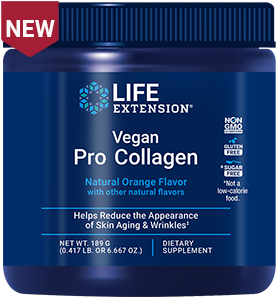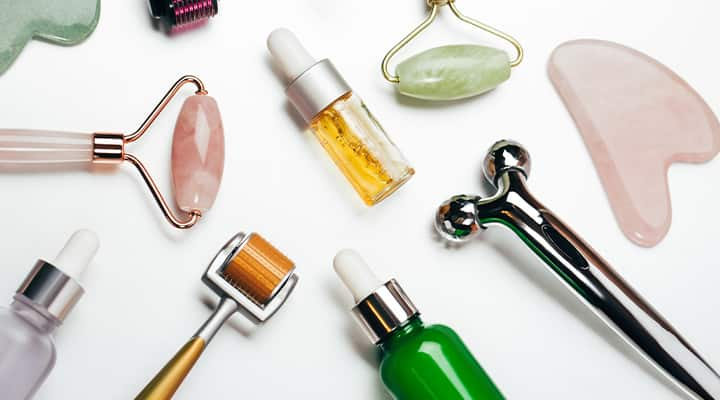
6 Best Skin Care Products for Women Over 40
Published: February 2022 | Updated: May 2023
Remember when you chose face creams based on whether the bottle was pretty or the lotion smelled like your favorite fruit? Ah, to be young again. Everything's fun and games with your skin care routine…until you start noticing the appearance of fine lines and wrinkles, and dry skin—which depending on your skin type, lifestyle and genetics, usually happens somewhere around age 40. That's when it's time to get serious and to make sure you're using science-based skin care products that have legit anti-aging effects.
This is where things get confusing, however. If you go to a beauty store or department store cosmetics counter, you might find yourself overwhelmed by the sheer volume of eye creams, neck creams, cleansers and other skin care products claiming to strip years off your appearance. Some of them have impressively scientific-sounding ingredients in them, like "amino-peptides," or claim to have "bio-restorative" properties. ("Micro-sculpting," anyone?)
But there's no need to overcomplicate things. Really, when it comes down to it, there are six expert-approved anti-aging skin care products that every woman over 40 should be using. (And that includes those of you who still have that fresh-faced glow well into middle age…because being proactive about your skin care routine is the only way to keep things that way!)
What are the top 6 skin care products a 40-year-old should use?
Whether you're 40, 50, 60, 70 or older, you've reached the life stage when you have "mature skin," and that means your skin routine needs to grow up, as well. No more falling asleep with eyeliner on (it's high time for a strategic nighttime skin routine), exfoliating only once in a blue moon, or forgetting to hydrate.
It's critical that you become selective about the anti-aging products you choose. Your goal is skin cell renewal, which means your strategy is to choose products that help replenish naturally occurring nutrients in your skin that encourage a glowing complexion. That means the active ingredients in your eye creams, rejuvenating creams, serums and cleansers matter much more than the scent or the consistency (although you certainly want those things to be pleasing, too!)
So, which skin care products are must-haves? Make room in your toiletries case for:
- Collagen
- Ceramides
- Niacinamide & botanical supplements
- Hyaluronic acid
- Retinol
- Plenty of water
(OK, the last one isn't exactly a "skin care product," but it's just as important, if not more.)
So why are these six items such important elements in skin care for women over 40? Let's dive in.
1. Collagen peptides—for strong, more elastic skin
When we age, we may gain wisdom and confidence…but we almost always lose collagen, which is an integral component of the skin (and joints) that makes it strong and resilient. Fortunately, there are several ways to get that collagen back into our skin (and our bodies).
Not just any collagen will do, however. You want to stick with collagen peptides, specifically. That's because collagen itself is a rather large molecule, making it hard to absorb. Peptides are portions of the collagen protein that can absorb into the skin via a really good face cream, and by the body if taken in supplement form.
Oral collagen products
: A systematic review of 11 studies and 805 participants found that supplementing orally with collagen peptides increased elasticity, hydration and collagen density.
Our pick(s): An oral supplement that contains both collagen peptides and keratin supports a more healthy, beautiful you, and it's easy to swallow. If you'd prefer a versatile collagen powder that can be mixed in coffee or even baked goods, chose one that has no flavor and mixes easily. (Bonus: if your knees aren't as springy as they used to be, this formula supports youthful movement and skin.)Creams and topical support
: A clinical trial of healthy female subjects aged between 40 and 50 found that using a topical collagen peptide for 28 days resulted in a significant increase in skin water content and elasticity, helping provide a more youthful look. Collagen peptide creams and balms are an excellent way to complement collagen supplementation, supporting a healthy and youthful-looking complexion.Vegan collagen alternative
: If you are avoiding animal products, you can choose a vegan collagen alternative that uses the same amino acid profile as type 1 collagen and has been proven to increase the skin’s collagen density and decrease the appearance of wrinkles and aging.
2. Ceramides—to retain skin moisture
Young looking skin isn't just unlined and elastic—it's also well-hydrated. As much as we may hate having oily skin when we're younger and worried about that greasy T-zone, dry skin seems like a much worse fate when we're worried about looking older than our years!
So how can you keep your skin youthful and dewy? One of the best ways to lock in moisture into your skin cells is by using another naturally occurring nutrient—ceramides. These fats are found within skin cells, and like collagen, they do decrease with age. Consuming ceramides—which are also found in certain foods—was found in a clinical trial to maintain skin's moisture content. You can also take an oral ceramide supplement that contains 350 mg of wheat oil extract providing ceramides; this is the the exact dosage which was found in several trials to support smooth, moist and supple skin in women.
Collagen vs. ceramides
Collagen and ceramides sure sound similar, and they get easily confused. So, what's the difference between these two popular anti-agers? Ceramides offer benefits for skin protection and hydration, while collagen helps your skin maintain its elasticity and youthful look. We recommend including both in your skin care regimen.
3. Safeguard your skin—from within
Be proactive about skin care and help protect your skin from the inside out! Our picks: Safeguard your skin during and after enjoying time outdoors with a niacinamide supplement. Skin supplements that help combat everyday oxidative stress and defend against pollution's impact on the skin are also a good option for city dwellers and those who are outside often.
Pro-tip: UV exposure isn't the only culprit for a dull and wrinkly complexion. Excess sugars negatively affect the springy and supple structure of your skin cells, a process known as glycation. But fear not; you can take your anti-aging skin care routine to the next level and combat sugars' skin-aging effects with nutrients like carnosine.
Explore Our Best Skin Care Products
4. Hyaluronic acid—to fight the appearance of wrinkles
The appearance of wrinkles might be a natural part of growing older, but that doesn't mean it's a welcome one! Good news: you can fight the appearance of fine lines, wrinkles and other age-related skin changes with hyaluronic acid.
What is hyaluronic acid? This naturally occurring component of skin serves as a humectant, which means it helps the skin retain water. Studies have found that hyaluronic acid-infused skin care products like serums have anti-aging and face rejuvenating effects—ultimately, fighting the appearance of wrinkles and fine lines, and supporting the actual structure of the skin, which tends to weaken with age.
5. Retinol—to support your skin's hyaluronic acid and collagen levels
So, we've established that youthful hyaluronic acid and collagen levels are pretty much synonymous with young-looking skin. Did you know that retinol can increase how much hyaluronic acid your skin expresses (which fights the appearance of wrinkles and fine lines)…and stimulates the natural production of collagen (which promotes smooth, strong skin)? Talk about a win-win!
Plus, retinol, a potent antioxidant, targets uneven skin tone and the appearance of dark spots—another common occurrence in aging skin. Win, win, win!
Look for a quality day cream and night cream that contain retinol, as well as other anti-aging must-haves like ceramides. Life Extension's skin care creams have retinyl palmitate, a gentler form of retinol known for its antioxidant properties and protection of skin cells.
6. Water—to hydrate from the inside out
Speaking of moisture, one of the easiest ways to hydrate your skin is to drink water. Getting enough H2O promotes healthier-looking skin by inhibiting dryness. Don't take our word for it, either—a systematic literature review of six studies found that dietary water intake can help increase skin hydration, particularly the outermost layer.
Water has other benefits that every woman over the age of 40 surely will enjoy—an easier time managing weight (because so many of us confuse hunger with thirst) and healthy digestion. So go ahead and get guzzling!
Which face cream is best for 40-year-old women?
We like an anti-aging cream that includes plant-derived ceramides and retinol at a bare minimum. That being said, even two women who are exactly the same age will have unique needs based on their skin type and skin tone, and women who have areas of sensitive skin may have even more specific needs, as they may need skin protectants that help combat free radicals. Of course, your derma is the ultimate resource on your skin health and can also point you towards other options.
Is hyaluronic acid or retinol better?
You really are better off using both hyaluronic acid and retinol after age 40. If you had to choose one over the other, consider whether you're more concerned about dry skin or sagging skin. Hyaluronic acid is great to help moisturize and hydrate skin, which is sometimes all it requires! On the other hand, retinol can help boost collagen production. This can help promote firmer, younger looking skin.
What about cleansers?
It goes without saying: clean skin is the foundation to any skin care routine, before even getting into anti-aging creams and serums. Exfoliating helps scrub away dead skin cells, smoothing your skin and help reduce the appearance of fine lines and wrinkles. Word to the wise: if you have sensitive skin, exfoliating too often is a no-no; stick with a mild cleanser, micellar water or gentle gel-cream for everyday face washing.
What else can I do for younger looking skin?
In addition to using anti-aging products that have expert recommended active ingredients, there are other ways you can support a youthful glow—at any age.
Eat beautifying foods
. Check out our registered dietitian's list of the best foods for skin, hair and nails. You'll notice a number of foods rich in vitamin C on her list...that's because this anti-oxidant isn't just an immune health nutrient; it's also a powerful anti-aging vitamin. And while it's true that you can apply it topically via a vitamin C serum, foods rich in vitamin C (or supplements) offer you beauty benefits from the inside out!Don't smoke
. You already know that smoking is terrible for your health…did you know it can make you look years older than you are?Exercise
. Regular workouts benefit your heart, your muscles, your stress levels, your efforts to maintain your weight…and all of that sweating and healthy blood flow actually supports your skin's appearance. (Just be sure to shower as soon as you've cooled down to avoid blemishes.)Be consistent
. Once you've adopted a healthier lifestyle and have established a great anti-aging routine, keep at it, even when you travel! You might not feel like applying serums after an exciting night out exploring a brand-new town, but you'll be glad you put in the time the next morning when you wake up looking bright-eyed and fresh-faced!
References
- Abbas Bukaru, Syed Nasir et al. "Hyaluronic acid, a promising skin rejuvenating biomedicine: A review of recent updates and pre-clinical and clinical investigations on cosmetic and nutricosmetic effects." Int J Biol Macromol, October 2018, https://pubmed.ncbi.nlm.nih.gov/30287361/
- B Huges, Maria Celia et al. "Sunscreen and prevention of skin aging: a randomized trial." Ann Intern Med., June 2013, https://pubmed.ncbi.nlm.nih.gov/23732711/
- D. Choi, Franchesca et al. "Oral Collagen Supplementation: A Systematic Review of Dermatological Applications." J Drugs Dermatol., January 2019, https://pubmed.ncbi.nlm.nih.gov/30681787/
- Guan, Linna L. et al. "Sunscreens and Photoaging: A Review of Current Literature." Am J Clin Dermatol., August 2021, https://www.ncbi.nlm.nih.gov/labs/pmc/articles/PMC8361399/
- Jaret, Peter. "Exercise for Healthy Skin." WebMD, April 2011, https://www.webmd.com/skin-problems-and-treatments/acne/features/exercise
- Juncan, Anca Maria et al. "Advantages of Hyaluronic Acid and Its Combination with Other Bioactive Ingredients in Cosmeceuticals." Molecules, August 2021, https://www.ncbi.nlm.nih.gov/labs/pmc/articles/PMC8347214/
- Krutmann, Jean et al. "Daily photoprotection to prevent photoaging." Photodermatol Photoimmunol Photomed., November 2021, https://pubmed.ncbi.nlm.nih.gov/33896049/
- Li, Wen-Hwa et al. "Topical stabilized retinol treatment induces the expression of HAS genes and HA production in human skin in vitro and in vivo." Arch Dermatol Res., May 2017, https://pubmed.ncbi.nlm.nih.gov/28247017/
- Maia Campos, Patricia M B G et al. "Topical application and oral supplementation of peptides in the improvement of skin viscoelasticity and density." J Cosmet Dermatol., December 2019, https://pubmed.ncbi.nlm.nih.gov/30834689/
- Okada, Haruko C et al. "Facial changes caused by smoking: a comparison between smoking and nonsmoking identical twins." PLast Reconstr Surg., November 2013, https://pubmed.ncbi.nlm.nih.gov/23924651/
- Oliveira, B. Marcela, et. al. "Topical Application of Retinyl Palmitate-Loaded Nanotechnology-Based Drug Delivery Systems for the Treatment of Skin Aging." Biomed Res Int. 2014. https://www.ncbi.nlm.nih.gov/pmc/articles/PMC3977527/
- Tsuchiya, Yoshihiro et al. "Containing Acetic Acid Bacteria for Improving the Stratum Corneum Hydration: A Randomized, Double-Blind, Placebo-Controlled Study over 12 Weeks." J Oleo Sci, November 2020, https://pubmed.ncbi.nlm.nih.gov/33055441/
- Wang, Zhen et al. "Aging-associated alterations in epidermal function and their clinical significance." Aging, March 2020, https://www.ncbi.nlm.nih.gov/labs/pmc/articles/PMC7138575/
- "Do retinoids really reduce wrinkles?" Harvard Health Publishing, October 2019, https://www.health.harvard.edu/staying-healthy/do-retinoids-really-reduce-wrinkles
Like what you read?
Please subscribe to get email updates on this blog.











